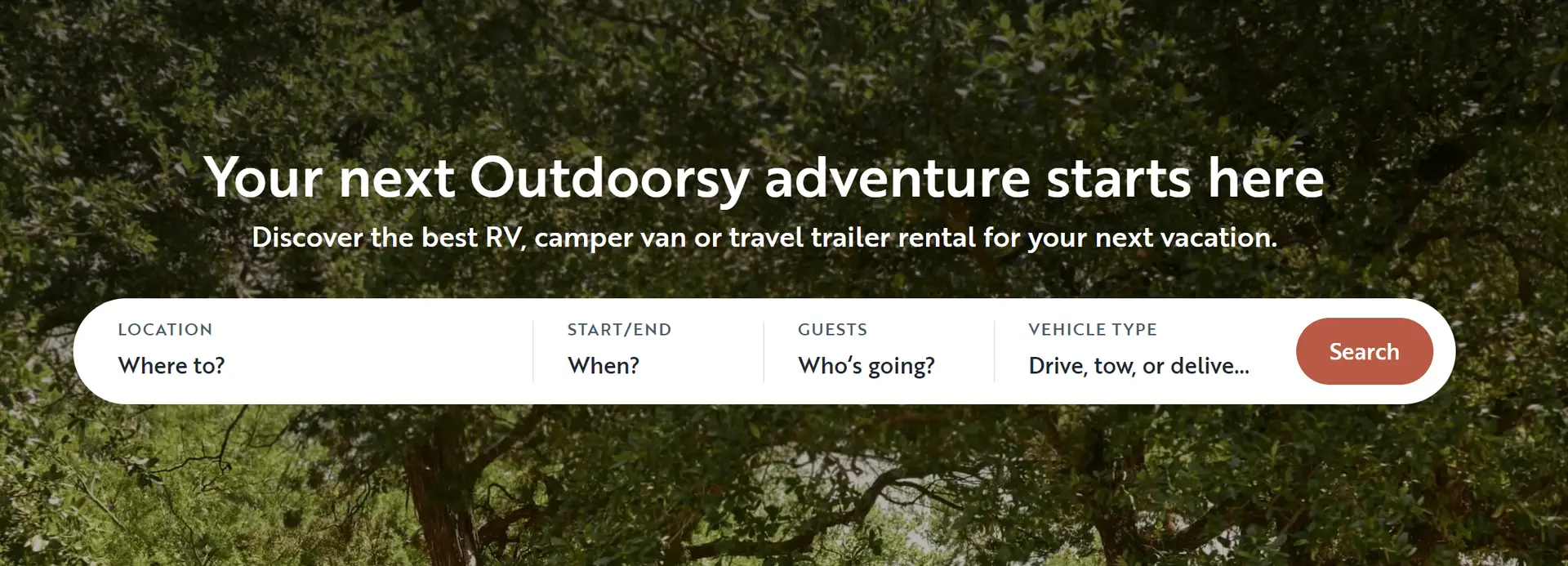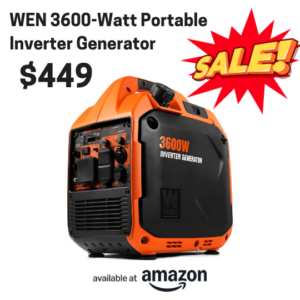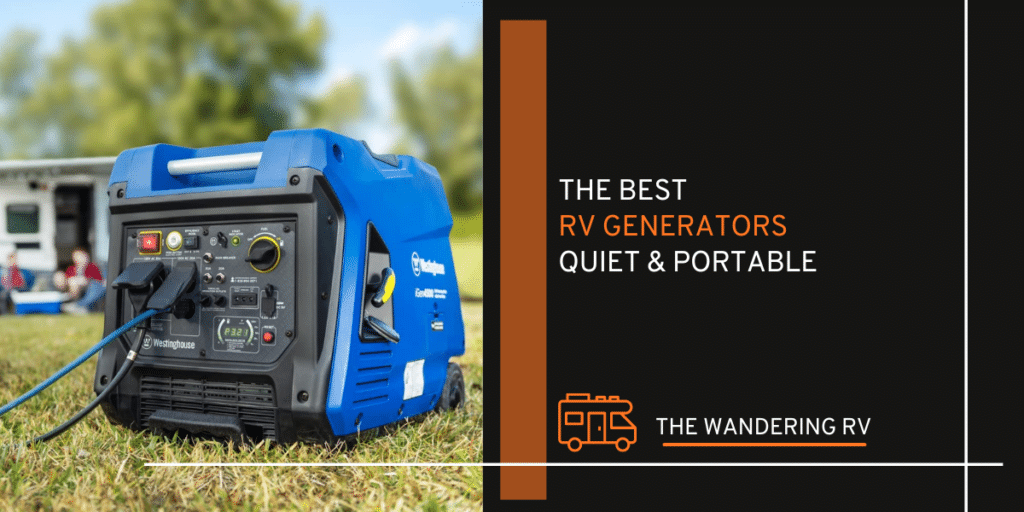
In the market for a new RV generator?
Welcome to the ultimate showdown of the best RV generators in 2023 (so far)! We’ve scoured the land to bring you the cream of the crop – the generators that will keep your RV running smoothly, your margarita blender blending, and your air conditioner blasting even in the hottest of summers.
We know that having a powerful generator is important, but we also know that you don’t want to wake up the entire campground with a thunderous roar. That’s why we’ve focused on finding generators that are as quiet as a mouse in slippers. No need to worry about disturbing your neighbors when you’re powering up your morning coffee.
Of course, we also know that you don’t want to break the bank when you’re looking for a generator. That’s why we’ve kept an eye on the price tag, making sure that our top picks won’t leave you feeling like you need to take out a second mortgage.
So, whether you’re a seasoned RV veteran or a newbie just starting out, sit back, relax, and get ready to meet your new best friend – the generator that will keep your RV running like a well-oiled machine, without waking up the entire campground in the process.
Let’s get started!
Table of Contents
- Best RV Generators 2023 Comparison Chart
- 8 Best RV-Ready Generators
- Things to Consider When Buying an RV Generator
- What Type of Fuel Is Best for Recreational Vehicle Generators?
- How to Connect a Portable Generator to Your RV
- Tips to Care for Your New Generator
Note: Some of the links in this article are affiliate links. This doesn’t cost you any more. Read our disclaimer for more info.
Best RV Generators 2023 Comparison Chart
Just want a quick comparison of the best RV generators for every budget? Here’s a comparison chart of all seven generators (with links to find them):
|
Name |
Rating |
Warranty | Watts |
Fuel Type | Weight | Hours on a full tank with a 1/2 load | Noise (dBA) |
Price |
Where to Buy |
|---|---|---|---|---|---|---|---|---|---|
 Cummins Onan | 4.5 / 5 | 1 Year/ 1,000 Hours | Varies – Usually 5.5kw |
Gas | varies (heavy) | Pulls from an external tank | 74 db |
$$$$ | Local Dealer |
 Honda EU 3000i | 4.5 / 5 | 2 Year/ 2,000 Hours | 3000 watts |
Gas | 131 lbs | 10 hours 3.4 Gal Tank | 58 db |
$$$ | Amazon |
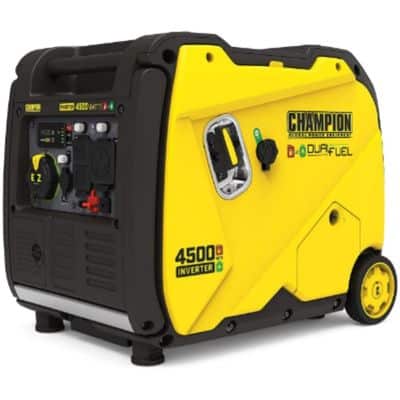 Champion 4500 Dual Fuel | 4.5 / 5 | 3 YearLimited | 4,500 watts |
Gas or Propane | 103 lbs | 8.5 hours 2.3 Gal Tank | 61 db | $$ | Amazon |
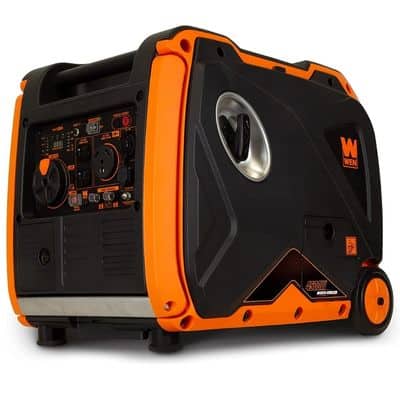 Wen 56455i Super Quiet | 4 / 5 | 2 Year Limited | 4,500 Watts |
Gas | 99 lbs | 8.5 hours 2.2 Gal | 57 db | $$ | Amazon |
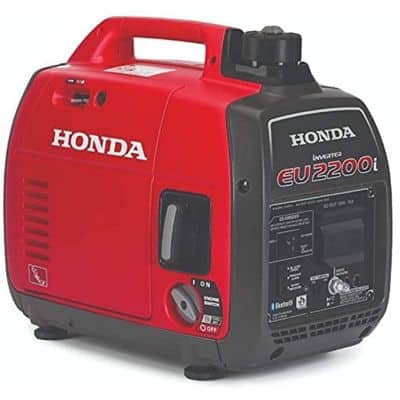 Honda EU2200i | 5 / 5 | 3 Year Limited | 2,200 Watts |
Gas | 47 lbs | 4.5 hours .9 Gal Tank | 48 db | $$ | Amazon |
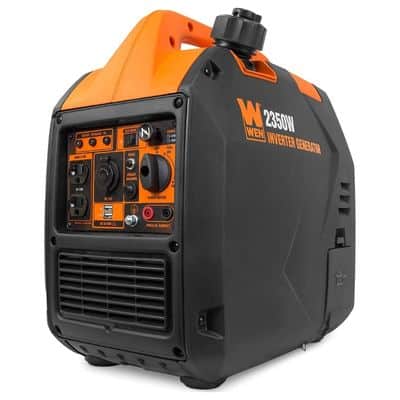 WEN 56235i Super Quiet 2350-Watt | 4.5/5 | 2 Year Limited | 2350 Watts | Gas | 39 lbs | 5.7 hours 1 Gal Tank | 51 db | $ | Amazon |
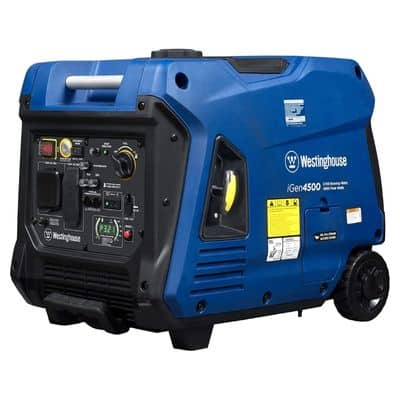 Westinghouse 4500 Watt | 5/ 5 | 3 Year Limited | 4,500 Watts |
Gas | 105 lbs | 9 Hours 3.4 Gal Tank | 52 db | $$ | Amazon |
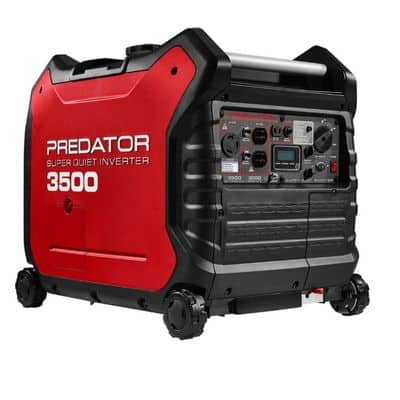 Harbor Freight 3500 Watt Harbor Freight 3500 Watt | 4.5 / 5 |
2 Year | 3,500 Watts |
Gas | 110 lbs | 6 Hours 2.3 Gal Tank | 56 db | $$ | Amazon |
8 Best RV-Ready Generators
In this section, we’ll break down why these are the best options on the market and take a deeper look at each one.
Best Built-In
Cummins Onan Generator
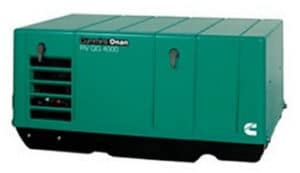
The Cummins Onan RV generator is the only generator on our list designed for permanent installation. It is gas-powered, comes with an internal muffler, and is rated at 68 decibels from 10 feet on a 50-percent load, meaning it meets National Park requirements for sound. It’s the best workhorse of all the RV generators we reviewed and is easy to use, reliable, and has the best output. Its ability to power a 15,000 BTU air conditioner with no effort is perhaps the best feature for hot summer camping trips with the family. It’s easily the most powerful generator you can buy. You can power equipment of any kind! Plus, this model’s side hatch makes it easy to refuel and maintain. It is, however, a rather hefty investment. But if reliability and ease of use are what you’re looking for, you can do no better than this little powerhouse.
Pros
- Quiet
-
Easy to operate
-
Can run a 15,000 BTU air conditioner
-
Microprocessor that protects against surges and spikes
-
Built into your RV
Cons
- Not portable
-
Very expensive
-
Harder to perform maintenance
Honda Reliability
Honda EU 3000i
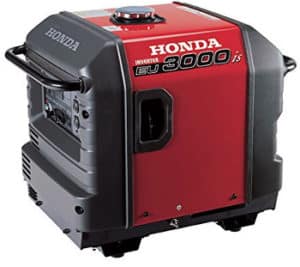
If you’ve done any preliminary research before finding this review, this entry should come as no surprise. Honda has been building extremely quiet, easy to operate generators for years. There’s a good reason these fly off the shelves when they’re available. Honda is one of the biggest, and most reliable, names in the generator business, and this powerful generator is no exception. It’s able to run a 13,500 BTU air conditioner with room left to spare for charging batteries. It throws out 2800 rated watts that are regulated by a microprocessor for powering your more sensitive electronics. You don’t need to worry about this little beast accidentally blowing out your tablets or cell phone. You can power equipment worry-free. Though Honda has not included any specifications on the decibel levels on their website, all independent reviews report this unit as very quiet. The onboard muffler allows little more than a low hum while it’s in operation.
Pros
- Extremely efficient
- Boasts up to 20 hours of use on 3.4 gallons of fuel
-
It can run parallel to other generators if needed
-
Has an electric ignition as well as a pull-start backup
-
Voted the quietest camping generator available
Cons
- Heavier than expected
-
The wheel cart is sold separately
Best Dual Fuel
Champion 4500-Watt Dual Fuel RV Generator
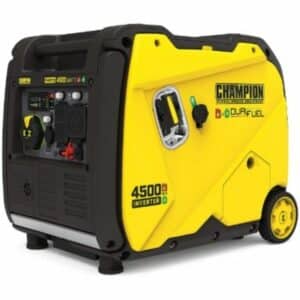
If you get a little sticker shock looking at the price tag of the Honda or the Cummins generator, this workhorse from Champion might be just what you need. It offers 3150 operating watts and can run a 13,500 BTU air conditioner just fine. The biggest selling point for this wonderful little generator is its ability to operate on either gas or propane. Champion has thoughtfully provided a propane hose with the unit, so setting it up on propane is very easy. This dual-fuel ability will give it a little longer run time and provide you with flexibility for refueling. Users report that it is just a little louder on average than some generators on the market, but it’s a trade-off that we think is worth it. According to the manufacturer, it’s only at 61 decibels from 23 feet, which is still quiet enough to enjoy a nice evening in a national campground. The price tag is another major selling point of this model. At half the price of the Honda, with very little drop-off in performance, this is an excellent buy for any RV owner who doesn’t want to trade quality for cost.
Pros
- Dual fuel—runs on either propane or gas
- 97 lbs
-
Parallel ready
-
Affordable
-
Runs for 8.5 hours on 1/2 load
- ELECTRIC START: Battery included, plus Quick Touch Panel allows you to access all your controls in one spot
- Quiet – 61db
Cons
- A little louder than Honda
-
Some users have reported issues with carburetor
Best Value
Wen 56455i Super Quiet 4,500 Watts
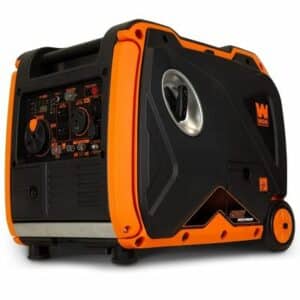
The Wen 56455i 4500 watt generator is a powerful and affordable option for anyone in need of reliable RV power. It has 4500 surge watts amd 3500 rated watts of power and the ability to run up to 8.5 hours at 1/2 load, it’s capable of handling a 15,000 BTU air conditioner. Despite its impressive power, the generator is surprisingly lightweight, weighing in at only 99 pounds. One of its standout features is its quiet operation at 59db, making it a great choice for camping, outdoor events, or in residential areas where noise is a concern. Overall, the Wen 4500 generator is a reliable and efficient power source that won’t break the bank.
Pros
- Electric start
- Digital readout
- 12v receptacles and USB ports
-
Relatively light
-
Super affordable
Cons
- Only a 2 year warranty
-
Smaller tank than other 4500 watt options
The Famous Honda EU2200i
Honda EU2200i
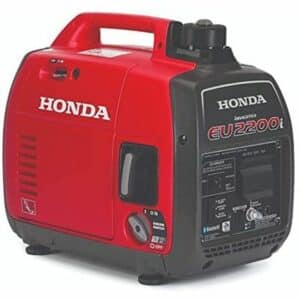
This is another excellent choice if you’re looking for a trailer-ready generator. It’s reliable and comes with a smart throttle to make sure you get every last drop out of your gas tank. These are the go to standard for small generators. Go to any RV campsite and you are bound to see several of these. They haven’t changed much throughout the years, so the competition is catching up. But, they now have a Honda My Generator App + Bluetooth Capability – Honda’s exclusive My Generator smartphone app offers remote generator operation and monitoring with impressive performance. The app includes wireless stop and operation monitoring. It also now has 10% more capability at 2,200 watts. You could PROBABLY power a 13,500 BTU air conditioner, but you’d be testing its limits.
Pros
- Comes with a smart throttle that automatically adjusts the fuel to the load you’re running
-
Onboard muffler makes it quiet
-
Inverter system with pulse modulation to avoid putting too much strain on sensitive electronic devices
-
Parallel ready
- Honda Reliability
Cons
- Outdated, may not be worth the premium as in the past.
- Very expensive compared to competitors
Best Value for Small Generator
WEN 56235i Super Quiet 2350-Watt
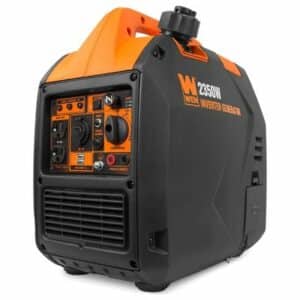
This WEN 56235i is one of the more economical models on our list. For its price, it’s a decent little generator that will handle most loads at 1900 watts for 5.7 hours and 2,350 peak watts. That means you should be able to run a 13,500 BTU AC unit for a while when you really need it. This is also the lightest weight of the group coming in at 39 lbs. They are also parallel ready, and feature an automatic low oil and low fuel shut off.
Pros
- Simple to operate
- Very affordable ($430 at the time of writing)
-
Lightweight and very portable
-
Parallel Ready
-
Low-oil and low-fuel automatic shutdown
Cons
- Only a 2 year warranty
- A tiny bit louder than the Honda
Best 4,500 Watt Option
Westinghouse 4500 Watt
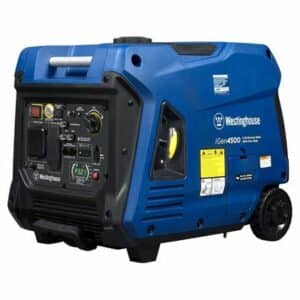
This thing is a beast. We have used it for years in one of our construction trailers, and it just keeps working! It puts out a good deal of power, has remote start and a digital readout. It has plenty of A/C receptacle options, USB ports, and even a DC battery charger. It is the most powerful option here with 4500 watts of peak power and 3700 rated watts. It is also one of the quietest at 52 dBA. It also has the largest fuel tank at 3.4 gallons, which gets you up to 18 hours on a full tank (at 1/4 load). Westinghouse also has a dual fuel mode version, if propane is your jam.
Pros
- Good power output at 3700 running watts
-
Remote start
-
3.4 gallons, 18 hour run time (1/4 load)
-
Extremely quiet at 52 dBA.
-
Westinghouse is a great reliable brand
- Affordable ($900 right now)
Cons
- Heavier than others (105 lbs)
- Doesn’t like to run well in altitude
I Love my Predator
Predator 3500 Watt
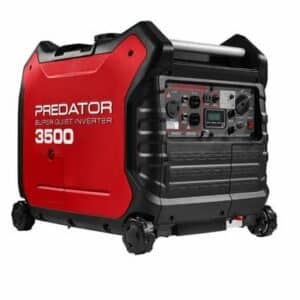
Looking for a generator that won’t wake up the neighbors? Say hello to the Predator 3500 generator! This bad boy is quieter than a library, delivering clean and efficient power with the reliability of a trusty Predator 212cc engine. With a 2.3 gallon fuel tank, it can run for up to 11 hours (that’s longer than most people’s work day!) at a 25% load. And thanks to its Electronic Speed Control Mode, you can optimize engine performance, maximize runtime, and minimize fuel consumption – all without having to don a lab coat or carry a slide rule. At just 56 dBA, this closed-frame inverter generator is about as loud as a polite conversation, so feel free to run it while you’re chatting up your neighbors about your upcoming camping trip. Plus, it’s lightweight, compact, and comes with smooth-rolling wheels, making it the perfect choice for your RV. I have owned one of these for about 3 years and it has never let me down. Now 4 of my friends have them in their trailer now. With a few small modifications, these can last forever. We installed a better spark arrestor and a magnetic drain plug to help keep it running clean. These used to be the best bang for your buck, but now the competition has caught up and you can get more power with less money from the likes of Westinghouse and WEN. But, I just couldn’t leave it out of this review!
Pros
- Very reliable Predator engine
- Extremely quiet
- Electric start
- Can power a 15,000 BTU A/C
- No frills, less things to break
- Has ECO mode and can run up to 11 hours (1/4 load)
- Parallel Ready
Cons
- There are cheaper options with more power.
- No USB ports
- Have had dust clog my carb (in a dust storm in Moab…)
- It’s heavy, at 110lbs, and doesn’t roll around that well
Things to Consider When Buying an RV Generator
The first thing to consider when buying an RV generator is how much you need it to power. Are you aiming to run a 15,000 BTU air conditioner and stereo system, or are you comfortable with a coffee maker and a few fans?
Conventional vs. Inverter Generator

A conventional generator runs on a simple engine at a regular speed. Because some modern electronics are sensitive to surges, this might not be the best option. This also makes them extremely loud and inefficient. You’ll be the least popular person at the campground with one of these! They typically look like this:
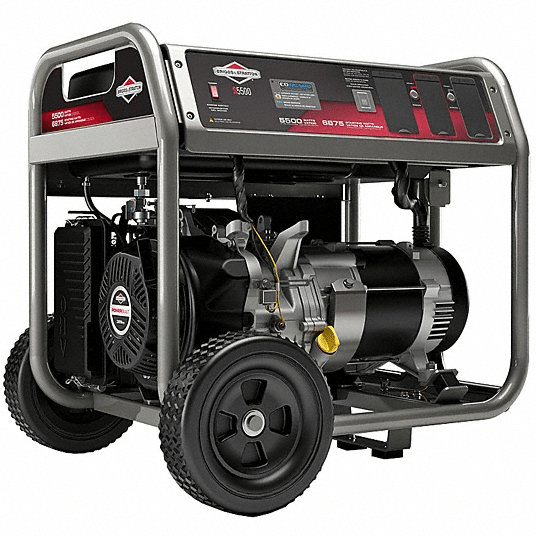
Sudden changes in current can cause severe damage to modern electronics, causing them to short out. In fact, most generators these days are inverters, and none of the generators we reviewed are conventional.
Inverter generators operate with a microprocessor that regulates and monitors the current which changes the throttle on the engine to produce power specifically for the load carried. This is both fuel-efficient and creates a more even current that is easier on your high-end devices such as cell phones and tablets.
Here’s a great video showcasing the differences.
Want to learn more? Check out our guide to RV electrical systems.
Power Output
The biggest consideration you’ll have is likely the power output. For instance, if you want to make sure that your 15,000-BTU air conditioner works consistently, you will need to guarantee that your generator can produce enough power to handle it.
Some devices such as microwaves and air conditioners create high demands on any generator. If you have these devices and want to run them regularly, make sure your generator has a high enough wattage output to handle it.
So, how big of a generator do you need to power your 15k BTU A/C? I have done it with my older 2,400-watt Predator, but it was not very happy about it! Air conditioners have a lot of surge power when first turning on, so it requires a lot of power in the first few seconds. It will only require about 1,500 watts to run, but 3,000 to 3,500 or surge watts. Therefore, I’d recommend anything about 3,500 to safely power it. And much more if you want to run other appliances at the same time. One thing that will help a lot is adding a hard start capacitor kit. They are super cheap and pretty easy to install. This reduces the amount of startup wattage your A/C will require.
Portable vs. Permanent
Most of the generators reviewed here are portable, as those are the most common RV generators available. Portable generators are great for taking camping, tailgating, or using in your home.
If you’d rather have the convenience of a permanent generator that is as easy to use as hitting a button, those are also available.
Permanent generators are installed directly on your RV unit and frequently tie into an onboard fuel source or backup RV battery. They’re usually installed by professionals and cost quite a bit more, but they do have the advantage of being a lot easier to use.
Noise
Noise is one of the most important considerations for a generator if you think you will be spending a lot of time camping in public or national parks. Most parks have regulations on the amount of noise they are willing to tolerate from generators. Besides, you’d probably rather not have a roaring, coughing monster destroying your peace.
All the generators here take generator sound into account and are rated as being quiet enough for any park. The general guideline for generators is that they need to be at a certain decibel level within a set distance. If you think your generator is far too noisy, there may be technical issues with it, and you should have a professional inspect it.
Fuel Consumption
You want to get the most out of the fuel you put into your generator. Of course, this also depends on the load you are placing on it. Keep in mind that higher loads will always deplete your fuel faster than lighter loads. The more you run, the quicker your fuel will run out.
What Type of Fuel Is Best for Recreational Vehicle Generators?
Diesel – Diesel generators are usually noisier and smellier than other types of fuel, but it has the advantage of burning much cleaner. This efficiency means you’ll get more use out of a single tank than with regular gasoline. However, diesel generators are rare.
Gas – Gas is one of the most common kinds of fuel for RV-ready generators. It’s common, though not always cheap. Many generators even offer a dual fuel option that allows you to run off gas and propane. It is important to use fuel without any ethanol in it, especially if you won’t be using it for periods of time. Ethanol will absorb water from the air and contaminate your fuel.
Propane – Propane is becoming much more common as a fuel in RV generators. As it becomes more popular, its availability is increasing. Propane has the advantage of running off of your already installed LP tanks, instead of lugging around fuel cans. Propane is harder to refill and is generally more expensive per gallon. Propane also burns cleaner, which allows the generator to last longer and requires less maintenance.
How to Connect a Portable Generator to Your RV
RVs and travel trailers are usually geared towards setting up with a portable generator. It’s a simple process.
- Drive the grounding rod into the ground where you want to place your portable unit.
- Connect the grounding rod to the unit with the copper wire provided.
- Start your generator and let it warm up for a couple of minutes.
- Use the RV or Travel Trailer’s generator cable to connect to the generator.
When in doubt, get a professional to help you! Most hardware stores and RV stores will be able to show you how to use your new tool.
Tips to Care for Your New Generator
Store it properly. Generator engines can get damaged when subject to moisture and weather. Make sure your generator is stored in a dry place. Before putting it away for the winter, wipe down the exterior, ensure the tank is full, add a fuel stabilizer, run it for a while to work the stabilized fuel through the system, and change the oil/oil filter. Alternatively, you can drain the fuel and lines. If possible, shut off the fuel and run the generator until it dies. This will drain the carb of any fuel and will increase its chances of starting next time!
Get it serviced regularly. Things can happen while your unit is idle: fuel lines can become clogged, and general engine wear can show up. Your service guide for the model you choose will give more information on regular servicing. We recommend following the service guidelines below.
Run your generator at least once a month. Regular use is the best way to guarantee proper function. It also helps you to discover any issues before they become a problem. Ideally, this should be done even if your generator is in storage and you don’t plan to use it anytime soon.
Never use old fuel. It’s crucial that you always use fresh fuel in your engine. Old fuel can create a build-up in the engine that can decrease performance. For best results, always keep your unit filled with fresh fuel. Fuel cycling is another reason running your unit monthly is advised. As I mentioned before, try not to use any fuel with ethanol in it.
Lubricate it regularly. Oil is one of the most vital elements of any gas-powered generator. Much like your car engine, you need to make sure that your generator is adequately lubricated at all times. A well-lubricated generator also has lower noise levels! Refer to your manual for the optimal oil type and perform oil and filter changes at least every six months. Since they hold less than a quart of oil, I spring for full synthetic for peace of mind. I also always replace the oil dipstick with a magnetic one to help keep it healthy. Since these don’t have an oil filter, this helps a lot.
Keep the batteries clean. Just like your car engine, you should make sure that the battery lines are always kept clean. Monitor the battery lines and make sure that the posts are kept free of build-up. It can help to disconnect them while your unit is not in use. Keeping them plugged into a battery tender is a great way to keep them fresh as well.
That’s It! Over to You.
Overall, our recommendation is to either get a permanent Cummins Onan RV generator (which is made specifically for RVs) or to grab the Westinghouse 4500 or WEN 56235i generator if you prefer something portable.
Read Next:

